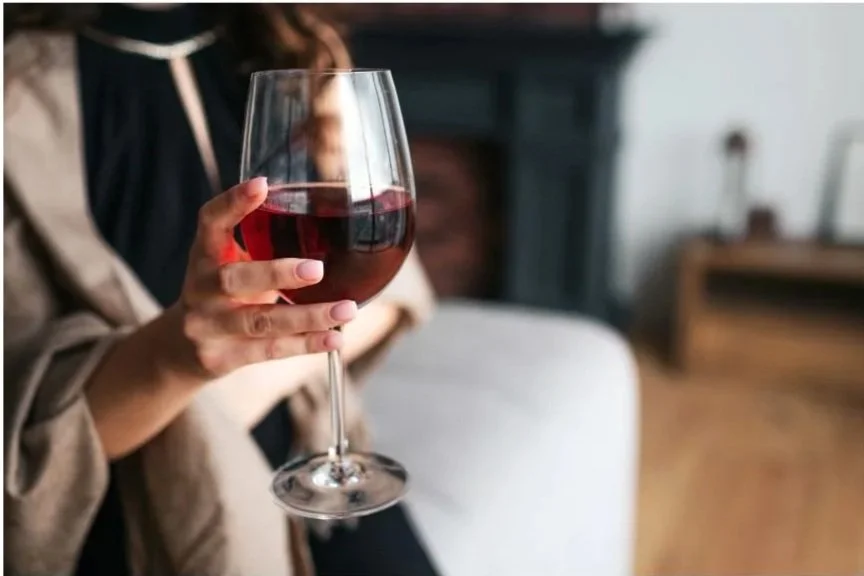Sip, Sleep, Repeat... and Regret: The Truth About Alcohol and Rest
You’ve had a long day. Dinner is done, the kitchen’s finally clean, and all you want is a little time to unwind. A glass of wine or your favorite cocktail feels like the perfect way to relax and maybe even help you fall asleep a little faster.
But lately... your sleep has been rough. You’re tossing and turning.
Waking up at 2 a.m. Feeling exhausted in the morning even when you “technically” got 7–8 hours. What gives? If this sounds familiar and you're in your 40s or beyond, there’s a good chance that a few things are converging: alcohol, changing hormones, and sleep quality. But even if you're not there yet, these same factors still affect you. Your hormones just aren’t shifting as much (yet). So keep reading!
Let’s break down what’s going on.
1. Alcohol might help you fall asleep, but it wrecks the second half of your night
That glass of wine acts as a depressant by increasing the calming neurotransmitter GABA, which can make you feel relaxed or even a little sleepy. That’s why it feels like it helps you fall asleep.
The catch? A few hours later, as your body metabolizes the alcohol, stimulating chemicals like norepinephrine and glutamate rise, often leading to restless, fragmented sleep, especially in the second half of the night. You’re more likely to wake up in the early hours and find it hard to fall back asleep.
We also hear a lot of people say things like, “But wine is good for you, right? It has antioxidants!” And yes, red wine contains small amounts of resveratrol, a plant compound with antioxidant properties, but to get any real benefit, you’d have to drink way more than what’s actually helpful (which would completely backfire in other ways). The negative effects on sleep, recovery, and hormone balance far outweigh that tiny potential perk, especially if your goal is to feel rested, strong, and energized.
2. Alcohol disrupts REM sleep (the really good stuff)
REM sleep is when your brain does a lot of its emotional and memory processing. It’s also the sleep stage that helps you wake up feeling refreshed.
Even low amounts of alcohol can suppress REM sleep, meaning your sleep might be lighter, less restorative, and more fragmented even if you’re in bed for a full eight hours.
3. It messes with your body temperature, too
Alcohol causes your blood vessels to dilate, which is why you might feel warm and cozy after a drink. But this also throws off your core temperature regulation during the night. That can lead to night sweats or random wake-ups because your body is too warm.
This becomes a bigger deal during perimenopause, when hormones (especially estrogen) are already making your internal thermostat more sensitive. If you’re in your 40s and noticing more night waking, heat, or disrupted sleep, this could be part of the puzzle.
4. It lowers melatonin (your sleep hormone)
Melatonin production happens naturally when it gets dark. It's your body’s signal that it’s time to wind down. Alcohol can suppress melatonin, making it harder to fall into a normal sleep rhythm and stay asleep through the night.
Even just one drink can have an effect.
5. It can worsen breathing issues like sleep apnea
If you’ve been told you snore, or your doctor has suggested a sleep study, this one’s especially important. Alcohol relaxes the muscles in the throat, which can worsen snoring or obstructive sleep apnea. This leads to more frequent breathing disruptions during the night and more daytime fatigue, even if you don’t remember waking up.
6. Alcohol can heighten anxiety (even if it feels relaxing at first)
It’s common to reach for a drink to “take the edge off,” especially after a long, stressful day. And in the moment, alcohol can feel like it’s helping you unwind. But here’s the catch: once it wears off, it can actually amplify anxiety often referred to as “hangxiety.”
As your body metabolizes alcohol, stress hormones like cortisol can increase. This can leave you feeling edgy, irritable, or more anxious the next day even if you can’t pinpoint why. And since perimenopause already comes with hormonal fluctuations that affect mood and stress tolerance, alcohol can intensify those emotional ups and downs.
If you’ve ever felt more anxious the day after drinking even if you only had one or two you’re not imagining it.
So... do I have to give up wine (or other alcohol) forever?
No you don’t have to. But our bodies view any amount and type of alcohol as a toxin/poison, so it may be worth giving it up completely if you feel compelled to. No one can make that choice but you. It may be the key that’s been missing to your health journey. Once it’s unlocked, why would you turn back?
Try experimenting with reducing or skipping alcohol a few nights a week and see how your sleep responds. Everyone’s tolerance and response is different, but many women in their 40s and 50s notice a big improvement in sleep quality when they cut back.
And if you’re working hard toward goals like fat loss, strength building, or more consistent energy sleep is a major piece of the puzzle. Protecting it will only help you feel better and see progress faster!
Want to learn more about The Habyt? We offer a FREE discovery call where we can answer all you questions!

